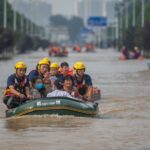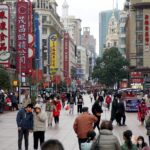Tianjin in North China on Friday achieved zero new cases in communities, 13 days after the first case was reported, marking a phased victory over the Omicron variant, a National Health Commission (NHC) official said at Saturday’s press conference, summarizing that sporadic resurgences in multiple domestic cities are showing positive signs of being brought under control.
The city reported six new Omicron infections on Saturday, all from the Jinnan district among the quarantined, marking zero cases in communities after four rounds of mass nucleic acid testing. Since January 8, the latest round of resurgence involved a total of 354 infections.
The infection chain in neighboring Beijing involving the Omicron variant has been curbed too, as new cases are uncovered only among people under quarantine, said He Qinghua, an official at the HNC, who added that another Delta variant transmission chain in Beijing remained complex and required quick screening and decisive control measures.
The quick response and control of sporadic flare-ups showed the effectiveness of China’s control measures and boosted public confidence in a safe and sound Spring Festival and Winter Olympic Games, observers said.
Thousands of Tianjin households under quarantine are free from control measures on Saturday and residents ventured outside and were met with a pleasant snowfall.
However, given the high degree of security needs for the upcoming Winter Olympic Games to be held in Beijing, the city’s health authorities on Saturday requested all districts in the capital to remain in emergency status for epidemic repose.
As Spring Festival approaches and a large number of migrant workers are expected to return to their hometowns, central authorities urged local governments to avoid a “one policy fits all” approach in managing returnees.
NHC officials said for rural areas that have relatively limited access to medical resources and will see large volumes of people returning home in the following week, it is important to identify potential infections early and transport them in closed-loop for verification and treatment.
People are encouraged to downgrade scale and number of banquets and gatherings, and carry out personal protection when going outside and attending those events. Village clinics that cannot handle fever patients must report the situation and send the suspected infected individuals for further testing and diagnosis, according to the press conference.
A medical worker takes a swab sample from a citizen for nucleic acid test at a COVID-19 testing site in north China’s Tianjin, Jan 15, 2022.Photo:Xinhua



